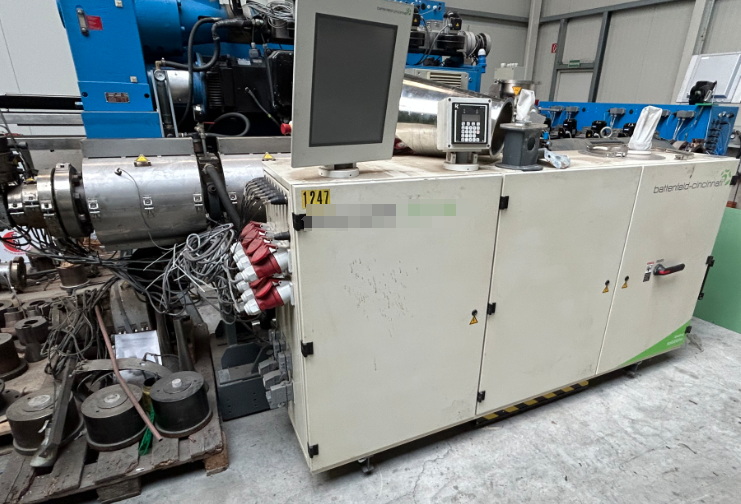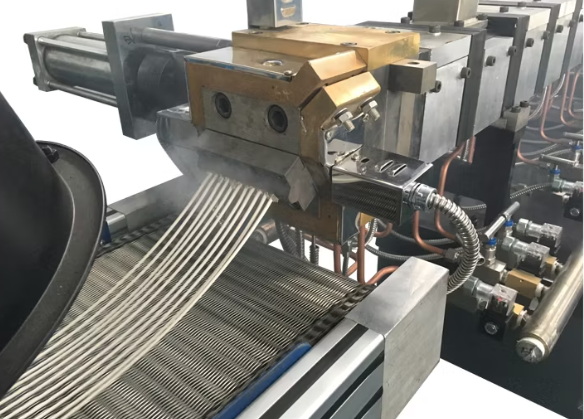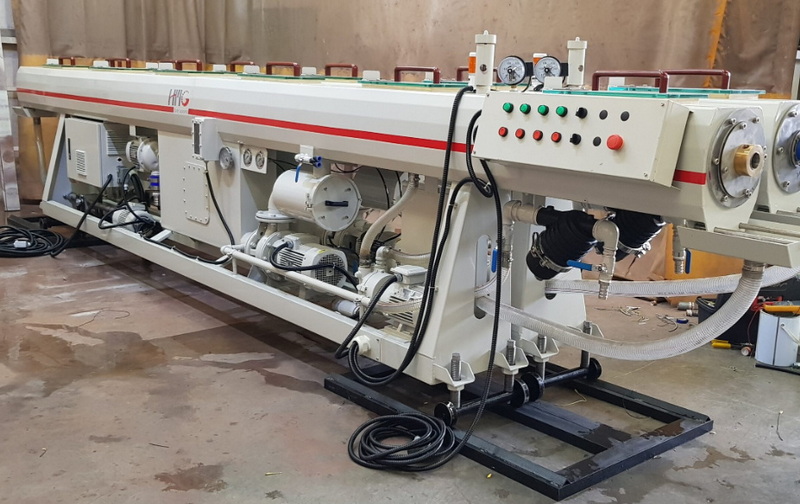Content Menu
● Introduction to Plastic Extrusion Machinery
>> Key Components of Plastic Extrusion Machinery
● Leading Manufacturers in Germany
>> 1. Coperion GmbH
>> 2. Leistritz AG
>> 3. Reifenhäuser Group
>> 4. KraussMaffei Group GmbH
>> 5. Esde Maschinentechnik GmbH
● Innovations in Plastic Extrusion Machinery
>> Sustainability Initiatives
>> Automation and Customization
● Market Trends and Future Outlook
>> Technological Advancements
>> Global Market Impact
● Challenges and Opportunities
>> Regulatory Environment
>> Innovation as a Competitive Edge
● Conclusion
● FAQs
>> 1. What are the primary applications of plastic extrusion machinery?
>> 2. How do German manufacturers contribute to sustainability in plastic extrusion?
>> 3. What types of extruders are commonly used in plastic extrusion machinery?
>> 4. What are the key factors driving the growth of the plastic extrusion machinery market?
>> 5. How does automation impact the plastic extrusion process?
Germany is renowned for its advanced manufacturing capabilities, particularly in the field of plastic extrusion machinery. This sector plays a crucial role in producing high-quality, durable, and precisely engineered plastic products that cater to various industries such as automotive, construction, electronics, and packaging. In this article, we will explore the leading manufacturers of plastic extrusion machinery in Germany, highlighting their innovations, technologies, and contributions to the global market.

Introduction to Plastic Extrusion Machinery
Plastic extrusion machinery is designed to transform raw plastic materials into continuous profiles, such as pipes, sheets, films, and custom parts. This process involves melting the plastic and forcing it through a custom-shaped die to create products with a consistent cross-section. The machinery is pivotal in industries requiring high-volume production of plastic components, such as construction, automotive, and packaging.
Key Components of Plastic Extrusion Machinery
1. Hopper: Where raw plastic material is loaded.
2. Barrel: Houses the extruder screw and is equipped with heaters.
3. Extruder Screw: Carries plastic pellets from the hopper to the die.
4. Die: Shapes the molten plastic into the desired profile.
5. Cooling System: Solidifies the extruded product.
Leading Manufacturers in Germany
1. Coperion GmbH
Coperion is a prominent manufacturer of multi-screw extruders, offering advanced solutions for compounding and recycling applications. Their machinery is designed to be energy-efficient and reliable, catering to the needs of the plastics processing industry. Coperion's focus on sustainability and innovation has positioned them as a leader in the market.
2. Leistritz AG
Leistritz specializes in the development and production of twin-screw extruders, known for their high mixing efficiency and versatility. Their machines are used in various applications, including compounding, recycling, and direct extrusion. Leistritz's commitment to quality and customer satisfaction has earned them a strong reputation globally.
3. Reifenhäuser Group
The Reifenhäuser Group is a leading provider of extrusion lines for producing films, sheets, and nonwovens. Their machinery is designed to enhance efficiency and sustainability in plastic production. Reifenhäuser's innovative solutions have made them a preferred choice for manufacturers seeking high-quality plastic products.
4. KraussMaffei Group GmbH
KraussMaffei offers a wide range of plastic extrusion machinery, including single and twin-screw extruders. Their focus is on delivering high-performance solutions for various plastic processing applications. With a strong emphasis on technological advancements, KraussMaffei continues to innovate and expand its product offerings.
5. Esde Maschinentechnik GmbH
Esde Maschinentechnik specializes in multi-screw extruders, providing customized solutions for compounding and recycling processes. Their machinery is known for its efficiency and reliability, making them a trusted partner for companies seeking tailored plastic extrusion solutions.

Innovations in Plastic Extrusion Machinery
The plastic extrusion machinery sector in Germany is continuously evolving, with a focus on sustainability, energy efficiency, and technological advancements. Companies are investing in research and development to create machinery that not only reduces environmental impact but also enhances production efficiency.
Sustainability Initiatives
- Recycling Technologies: Many German manufacturers are developing machinery capable of processing recycled materials, reducing plastic waste and promoting circular economy practices.
- Energy Efficiency: Modern extruders are designed to consume less energy while maintaining high output levels, contributing to reduced carbon footprints.
Automation and Customization
- Automation: The integration of automation technologies in plastic extrusion machinery is enhancing production speed and reducing labor costs. Automated systems can monitor and adjust production parameters in real-time, ensuring consistent product quality.
- Customization: Manufacturers are offering more customized solutions to cater to specific industry needs, such as multi-layer films and complex profiles. This flexibility allows companies to produce a wide range of products tailored to their customers' requirements.
Market Trends and Future Outlook
The global demand for plastic extrusion machinery is on the rise, driven by increasing needs in the construction, automotive, and packaging sectors. German manufacturers are well-positioned to meet this demand with their innovative and efficient machinery solutions.
Technological Advancements
- Digitalization: The integration of digital technologies, such as IoT sensors and AI, is transforming the plastic extrusion process. These technologies enable real-time monitoring, predictive maintenance, and optimized production processes.
- Sustainable Materials: There is a growing interest in using bioplastics and other sustainable materials in extrusion processes. German manufacturers are at the forefront of developing machinery capable of processing these materials efficiently.
Global Market Impact
German manufacturers are not only leaders in the European market but also have a significant presence globally. Their machinery is exported to various countries, contributing to the growth of the plastic extrusion industry worldwide. The reputation for quality and innovation has made German-made machinery a preferred choice for many international companies.
Challenges and Opportunities
Despite the advancements and growth in the plastic extrusion machinery sector, there are challenges that manufacturers must address. These include regulatory pressures to reduce plastic waste, increasing competition from emerging markets, and the need for continuous innovation to stay competitive.
Regulatory Environment
- Plastic Waste Reduction: Governments worldwide are implementing stricter regulations to reduce plastic waste. German manufacturers are responding by developing machinery that supports recycling and the use of recycled materials.
- Competition: The rise of manufacturers in Asia and other regions presents both challenges and opportunities. German companies must continue to innovate and emphasize their quality and reliability to maintain market share.
Innovation as a Competitive Edge
To stay ahead, German manufacturers are investing heavily in research and development. This focus on innovation allows them to offer cutting-edge solutions that meet evolving customer needs and regulatory requirements.
Conclusion
Germany's plastic extrusion machinery sector is a global leader, offering cutting-edge solutions that meet the evolving demands of various industries. With a focus on sustainability, efficiency, and customization, German manufacturers are poised to continue their dominance in the market. As technology advances and environmental concerns grow, the role of these manufacturers in shaping the future of plastic production will be increasingly important.

FAQs
1. What are the primary applications of plastic extrusion machinery?
Plastic extrusion machinery is used to produce a wide range of products, including pipes, sheets, films, and custom profiles. These products are essential in industries such as construction, automotive, packaging, and consumer goods.
2. How do German manufacturers contribute to sustainability in plastic extrusion?
German manufacturers are at the forefront of sustainable practices in plastic extrusion by developing machinery that processes recycled materials and reduces energy consumption. This helps minimize waste and lower carbon emissions.
3. What types of extruders are commonly used in plastic extrusion machinery?
The most common types of extruders are single-screw and twin-screw extruders. Single-screw extruders are cost-effective for simple profiles, while twin-screw extruders offer superior mixing capabilities for complex applications.
4. What are the key factors driving the growth of the plastic extrusion machinery market?
The growth of the plastic extrusion machinery market is driven by increasing demand from the construction, automotive, and packaging sectors, along with technological advancements and sustainability initiatives.
5. How does automation impact the plastic extrusion process?
Automation in plastic extrusion enhances production efficiency by reducing reliance on manual labor, increasing precision, and allowing for continuous operation. This leads to higher productivity and lower production costs.






















